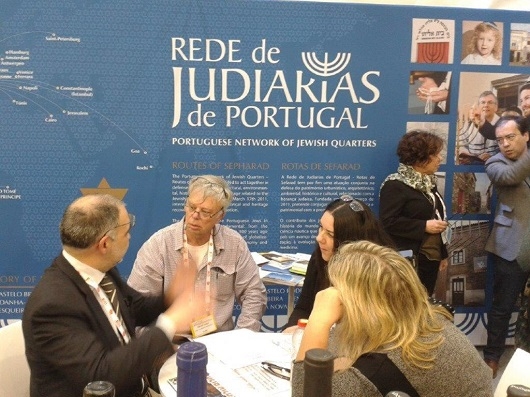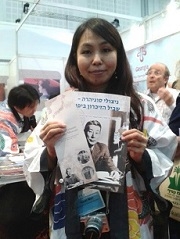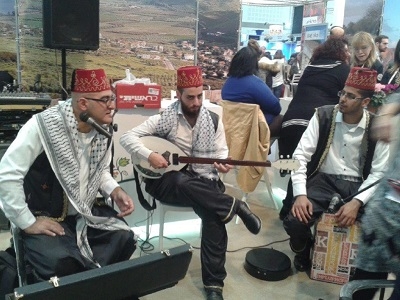Rushing Round Tourism Expo
Photos & text: Lydia Aisenberg
The Israel Tourism Exhibition held recently in Tel Aviv certainly gave visitors the feeling of globetrotting without leaving home base. All it took to glean an "around the world in 80 minutes rush" was to stroll around the enormous exhibition hall where countries as diverse as Rwanda, Vietnam, Morocco, Malta and the Balkans - and almost everywhere on the tourism map in between - had set up eye-catching, inviting and extremely interesting stands.
A quarter of the exhibition stands promoted different regions of Israel. The diversity of what is on offer in our small country is mind-boggling in itself. Among stands touting tourism in the Galilee, Central Israel and the Negev, were also those of organizations promoting tourism ventures run by Jewish and Arab partnerships as a way of nurturing better understanding and dialogue through mutual love of nature and cuisine.
One of the busiest stands, and I mean that literally, pulling in many a visitor looking to quench a thirst, was that of an Israeli brewing company doing brisk business handing out liberal glasses of their popular brand of beer straight from the barrel.
Musicians from Greece played, sang and danced in the crowded passageway between them and some far off neighbors … on the map that is. Druze musicians from the Galilee, dressed in national costume, equally energetically played their ouds and flutes to an appreciative audience of both Israeli and overseas visitors – the Galilean goat's cheese handed out liberally proving to be an extremely tasty calling card.
Tourism exhibitions are always heartwarming. So many different countries, languages, cultures and histories all showing off, literally preening the positive side of their country to potential guests, differences put aside, politics left well outside the exhibition grounds, as the come-and-join-us special offers and promises of a magical holiday are promoted.
Two stands I found of particular interest were those of Portugal and Japan, very diverse countries in every way, but here, at the Tel Aviv exhibition grounds, the common thread being promoted (with the most attractive reading material and experts on hand) was the Jewish historical connection to those countries.
The Portuguese focused on places of Jewish interest, renovated synagogues and museums depicting life of the Jews in the pre-Inquisition Golden Era. The Japanese concentrated on the story of the diplomat and savior of thousands of Jews, vice-consul at the consulate in Lithuania during the summer of 1940, Chiung Sugihara, who issued visas to desperate Jews.
Twenty-something Yuuki Mori, speaking excellent English and dressed in traditional Japanese costume, spoke of Chiung Sugihara with great pride. She also emphasized a museum known as The Port of Humanity Tsuruga Museum, opened at the Japanese port, where the story of thousands of Polish orphans (non-Jews) and Jewish refugees he saved disembarked the ships to freedom. "The museum portrays unforgettable stories of life and peace," said Mori.
A member of staff from the Portuguese Castelo de Vide Municipality Tourist Department was busily engaged with visitors to the stand of her country. The stand was decorated with an enormous and attractive blue and white wall poster depicting a large menorah and Rede de Judiarias de Portugal, the menorah worked into the letter 'I' in Judiarias.
"Castelo de Vide was a unique place that managed to merge Christian, Jewish, peasant and noble legacies like no other town," states an attractive pamphlet in English. The synagogue of Castelo de Vide contains a memorial dedicated to local victims of the Inquisition, and the building also contains an exhibition on the "Jewish Diaspora and Castelo de Vide's most famous son, scientist and botanist, Garcia D'Orta." D'Orta's family was Jewish.
The representative from Castelo de Vide explained in depth and with great charm about some of the major centers of Jewish interest throughout Portugal today. He also mentioned that if one was of Portuguese Sephardic Jewish heritage, it was now possible, with the right paperwork of proof, to apply for Portuguese citizenship. A number of people were waiting in line to speak with two gentlemen manning a table in the center of the stand, advocates and representatives of Pares, an organization set up to help those descendants interested in the possibility of claiming citizenship.
I walked away from the Portuguese stand somewhat perplexed. As a British-born Israeli, living in the country 50 years and actively engaged in encouraging visits to Israel and making aliyah, it was somewhat disturbing to watch Israelis line up to claim citizenship in a country which threw out – at best – their ancestors.










Comments